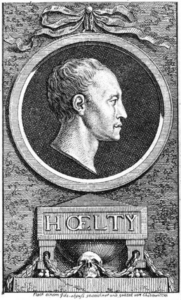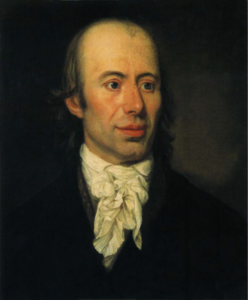To the nightingale
(Poet's title: An die Nachtigall)
Set by Schubert:
D 196
[May 22, 1815]
Geuß nicht so laut der liebentflammten Lieder
Tonreichen Schall
Vom Blütenast des Apfelbaums hernieder,
O Nachtigall!
Du tönest mir mit deiner süßen Kehle
Die Liebe wach;
Denn schon durchbebt die Tiefen meiner Seele
Dein schmelzend Ach!
Dann flieht der Schlaf von neuem dieses Lager,
Ich starre dann,
Mit nassem Blick, und totenbleich und hager
Den Himmel an.
Fleuch Nachtigall, in grüne Finsternisse,
Ins Haingesträuch,
Und spend im Nest der treuen Gattin Küsse;
Entfleuch, entfleuch!
Do not pour them out so loudly those songs that are aflame with love
Making such a musically rich sound
As they come down from the blossoming branch of the apple tree,
Oh nightingale.
With your sweet throat you are striking a chord in me,
Awakening love,
Since a tremor is already rumbling through the depths of my soul:
Your melting ‘Ah’.
Then yet again sleep flees from this bed,
I then gaze
With a damp look, pale as death and gaunt,
Staring at the sky.
Flee, nightingale, into the green darkness,
Into the undergrowth of the grove,
And in your faithful spouse’s nest offer kisses,
Fly off, fly off!
All translations into English that appear on this website, unless otherwise stated, are by Malcolm Wren. You are free to use them on condition that you acknowledge Malcolm Wren as the translator and schubertsong.uk as the source. Unless otherwise stated, the comments and essays that appear after the texts and translations are by Malcolm Wren and are © Copyright.
☙
Themes and images in this text:
Apples and apple trees Bushes and undergrowth Earthquakes Fire Fleeing Flowers Flying, soaring and gliding Green Heaven, the sky High, low and deep Husband and wife Kissing Melting Nests Night and the moon Nightingales, Philomel Pouring, scattering and strewing Sighs and sighing Sleep Sounds Striking and hitting Sweetness Throats Trees (general) Woods – groves and clumps of trees (Hain)
Note that it is not exactly the noise that is keeping him awake; the problem is that the nightingale’s song is reverberating too significantly and causing an uncomfortable awakening. The poet at first asks the bird to keep the noise down but soon realises that the effect of its singing is too deep already; the melting sigh has already set him trembling. The earthquake of love is rumbling. So yet again (‘von neuem’ stanza 2) sleep has abandoned him. We surely can’t blame the bird for that, all it did was open its ‘sweet throat’ (stanza 1) and thereby struck a chord in the poet’s soul (‘Du tönest mir . . . / Die Liebe wach’, stanza 1).
The effect is not pleasant: insomnia, sweating, palour, loss of appetite, aimless staring into space (stanza 2). By the end of the poem the speaker has lost patience with (and seems to have become envious of) the bird. “Clear off and devote your energy to your wife since you are lucky enough to have one! At least your nest is not empty. You can make offerings to a partner while I am left here with no outlet for what is bottled up inside me.”
NB In the previous week (in May 1815) Schubert had set two Hölty texts that shared many of the images found here (D 193 An den Mond and D 194 Die Mainacht). On the same day that he set An die Nachtigall he also composed D 197 An die Apfelbäume , wo ich Julien erblickte, D198 Seufzer and D 199 Mailied. Although the month is not stated explicitly in An die Nachtigall, it too almost certainly refers to May since the apple blossom is out.
☙
Original Spelling An die Nachtigall Geuß nicht so laut der liebentflammten Lieder Tonreichen Schall Vom Blütenast des Apfelbaums hernieder, O Nachtigall. Du tönest mir mit deiner süßen Kehle Die Liebe wach; Denn schon durchbebt die Tiefen meiner Seele Dein schmelzend Ach. Dann flieht der Schlaf von neuem dieses Lager, Ich starre dann Mit naßem Blick, und todtenbleich und hager Den Himmel an. Fleuch, Nachtigall, in grüne Finsternisse, Ins Haingesträuch, Und spend' im Nest der treuen Gattin Küsse; Entfleuch, entfleuch!
Note on the text
Hölty did not complete his draft of “An eine Nachtigall, die vor meinem Kammerfenster sang” (To a nightingale which sang in front of the window of my room), and Voß’s version of the text was all that was known before Karl Halm’s edition of 1869.
Hölty’s unfinished draft
Gieß nicht so laut die liebeglühnden Lieder,
Zu meiner Quaal,
Vom Blüthenast des Apfelbaums hernieder,
O Nachtigall!
Sie tönen mir, o liebe Philomele,
Das Bildniß wach,
Das lange schon, in meiner trüben Seele,
Im Schlummer lag.
Es steht vor mir im leichten Nachtgewande,
* * * * *
Die Unholdinn verbannet Rast und Schlummer
Durch ihren Stab,
Und stürzet uns, nach jahrelangem Kummer,
Wohl gar ins Grab.
Sie trinkt voll Gier von unserm Herzensblute,
Und schwelgt sich satt;
Giebt Dornen dem, der sonst auf Rosen ruhte,
Zur Lagerstatt.
Und machet ihm die Welt zum offnen Grabe,
Das seiner harrt.
Unglücklich, wer von ihrem Zauberstabe
Getroffen ward!
Fleuch tiefer in die grünen Finsterniße,
O Sängerin,
Und spend im Nest der treuen Gattin Küße,
Fleuch hin, fleuch hin!
Voß’s version
Geuß nicht so laut der liebentflammten Lieder
Tonreichen Schall
Vom Blütenast des Apfelbaums hernieder,
O Nachtigall.
Du tönest mir mit deiner süßen Kehle
Die Liebe wach;
Denn schon durchbebt die Tiefen meiner Seele
Dein schmelzend Ach.
Dann flieht der Schlaf von neuem dieses Lager,
Ich starre dann
Mit naßem Blick, und todtenbleich und hager
Den Himmel an.
Fleuch, Nachtigall, in grüne Finsternisse,
Ins Haingesträuch,
Und spend’ im Nest der treuen Gattin Küsse;
Entfleuch, entfleuch!
Confirmed with Ludwig Christoph Heinrich Hölty’s Sämtliche Werke kritisch und chronologisch herausgegeben von Wilhelm Michael, Erster Band, Weimar, Gesellschaft der Bibliophilen, 1914, page 110, and with Gedichte von Ludewig Heinrich Christoph Hölty. Nebst Briefen des Dichters herausgegeben von Karl Halm. Leipzig: F.A. Brockhaus, 1869, pages 172-173.
Confirmed by Peter Rastl with Schubert’s source, Gedichte von L. H. Ch. Hölty. Neu besorgt und vermehrt von Johann Heinrich Voß. Wien, 1815. Bey Chr. Kaulfuß und C. Armbruster. Gedruckt bey Anton Strauß. Meisterwerke deutscher Dichter und Prosaisten. Drittes Bändchen. page 128; and with Gedichte von Ludewig Heinrich Christoph Hölty. Besorgt durch seine Freunde Friederich Leopold Grafen zu Stolberg und Johann Heinrich Voß. Hamburg, bei Carl Ernst Bohn. 1783, page 157.
To see an early edition of the text, go to page 128 [206 von 300] here: http://digital.onb.ac.at/OnbViewer/viewer.faces?doc=ABO_%2BZ15769170X



